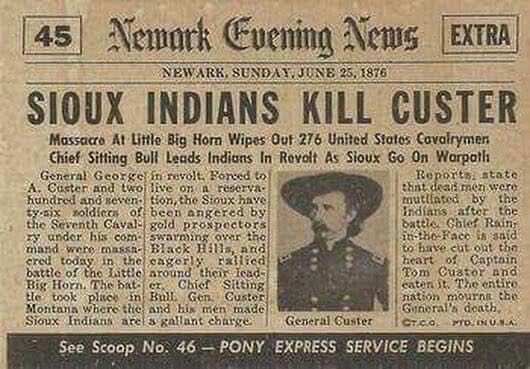
- Details
- By Native News Online Staff
This Day in History. Today is known as Victory Day among many Lakota, Cheyenne and Arapaho people.
On this day—June 25, 1876—the Lakota, Cheyenne and Arapaho peoples united to overcome, defeat and kill the entire US Army’s 7th Cavalry led by General George Armstrong Custer. Many people know this as Custer’s Last Stand and call what happened that day as a massacre.
The Hunkpapa, Minniconjou, Itazipco, Oglala and Sahiyela Lakota with the Cheyenne and Arapaho fought racism and won.
It was the only time the United States flag has been captured on Turtle Island and it belongs to the Lakota people. In the following decades, Custer and his troops came to be considered iconic, even heroic, figures in American history.
However, Native Americans have a completely differenct perspective on Custer has been known to hunt down Native women, children and elders and this was his tactic in pursuing the encampment that was attacked. The victory by the Tribes was used as a tool to continue to oppress the tribes. The death of Custer and his troops increased efforts to force Native peoples onto reservations.
Most of the declared "hostiles" had surrendered within one year of the fight, and the Black Hills were taken by the US government without compensation. Mt. Rushmore would be built on sacred land—the Black Hills—belonging to the Lakota.
Some call it a massacre, some call it a victory.
More Stories Like This
Native News Weekly (August 25, 2024): D.C. BriefsNavajo Nation Mourns the Passing of Former Vice President Rex Lee Jim
Deb Haaland Earns Endorsement From Communications Workers of America Local 7076
University Soccer Standout Leads by Example
Two Native Americans Named to Democratic Congressional Campaign Committee's“Red to Blue” Program
Help us defend tribal sovereignty.
At Native News Online, our mission is rooted in telling the stories that strengthen sovereignty and uplift Indigenous voices — not just at year’s end, but every single day.
Because of your generosity last year, we were able to keep our reporters on the ground in tribal communities, at national gatherings and in the halls of Congress — covering the issues that matter most to Indian Country: sovereignty, culture, education, health and economic opportunity.
That support sustained us through a tough year in 2025. Now, as we look to the year ahead, we need your help right now to ensure warrior journalism remains strong — reporting that defends tribal sovereignty, amplifies Native truth, and holds power accountable.
 The stakes couldn't be higher. Your support keeps Native voices heard, Native stories told and Native sovereignty defended.
The stakes couldn't be higher. Your support keeps Native voices heard, Native stories told and Native sovereignty defended.
Stand with Warrior Journalism today.
Levi Rickert (Potawatomi), Editor & Publisher


